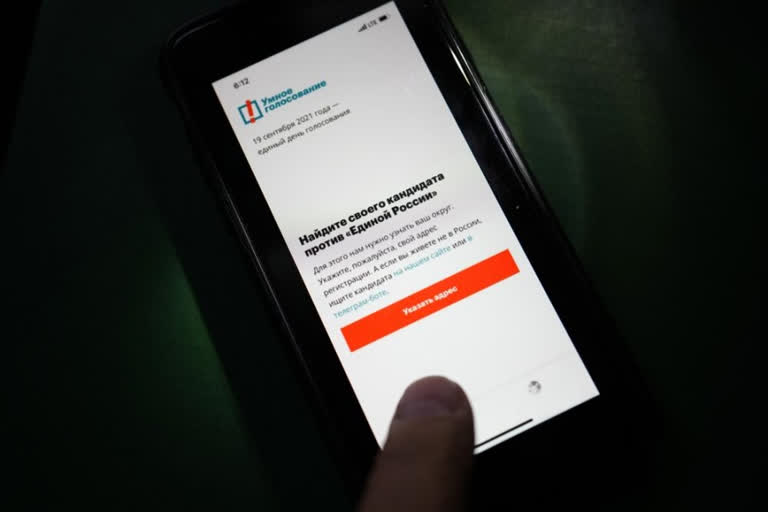Moscow: Facing Kremlin pressure, Apple and Google on Friday removed an opposition-created smartphone app that tells voters which candidates are likely to defeat those backed by Russian authorities, as polls opened for three days of balloting in Russia’s parliamentary election.
Unexpectedly long lines formed at some polling places, and independent media suggested this could show that state institutions and companies were forcing employees to vote. The election is widely seen as an important part of President Vladimir Putin’s efforts to cement his grip on power ahead of the 2024 presidential polls, in which control of the State Duma, or parliament, will be key.
Russian authorities have sought to suppress the use of Smart Voting, a strategy designed by imprisoned opposition leader Alexei Navalny, to curb the dominance of the Kremlin-backed United Russia party.
Apple and Google have come under pressure in recent weeks, with Russian officials telling them to remove the Smart Voting app from their online stores. Failure to do so will be interpreted as interference in the election and make them subject to fines, the officials said.
Last week, Russia’s Foreign Ministry summoned U.S. Ambassador John Sullivan over the issue.
On Thursday, representatives of Apple and Google were invited to a meeting in the upper house of Russia’s parliament, the Federation Council. The Council’s commission on protecting state sovereignty said in a statement afterward that Apple agreed to cooperate with Russian authorities.
Also read:Germany protests to Russia over pre-election cyberattacks
Apple and Google did not respond Friday to a request from The Associated Press for comment.
Google was forced to remove the app because it faced legal demands by regulators and threats of criminal prosecution in Russia, according to a person with direct knowledge of the matter who also said Russian police visited Google’s Moscow offices Monday to enforce a court order to block the app. The person spoke on condition of anonymity because of the sensitivity of the issue.
Kremlin spokesman Dmitry Peskov said Friday the presidential administration “definitely, of course” welcomes the companies’ decision, because the app was “outside the law” in Russia.
In recent months, authorities have unleashed a sweeping crackdown against Navalny’s allies and engaged in a massive effort to suppress Smart Voting.
Navalny is serving 2½-year prison sentence for violating parole over a previous conviction he says is politically motivated. His top allies were slapped with criminal charges and many have left the country. Navalny’s Foundation for Fighting Corruption, as well as a network of regional offices, have been outlawed as extremist organizations in a ruling that exposes hundreds of people associated with them to prosecution.
About 50 websites run by his team have been blocked, and dozens of regional offices have been closed. The authorities have moved to block the Smart Voting website as well, but some users can still access it. Navalny’s team also created a Smart Voting chat bot on the messaging app Telegram and published a list of candidates Smart Voting endorses in Google Docs and on YouTube.
Close Navalny ally Ivan Zhdanov on Friday tweeted a screenshot of what appears to be an email from Apple, explaining why the app should be removed from the store. The screenshot cites the extremism designation for the Foundation for Fighting Corruption and allegations of election interference. “Google, Apple are making a big mistake,” Zhdanov wrote.
Leonid Volkov, Navalny’s top strategist, wrote on Facebook that the companies “bent to the Kremlin’s blackmail.” He noted that the move doesn’t affect users who have already downloaded the app, and that it should be functioning correctly.
Also read:Top ally announces closing Navalny's offices amid crackdown
Volkov told the AP last month that at some point in August, the app ranked third on Google Play in Russia among social networking apps and fourth on the App Store in the same category.
Peskov on Friday called Smart Voting “another attempt at provocations that are harmful for the voters.”
